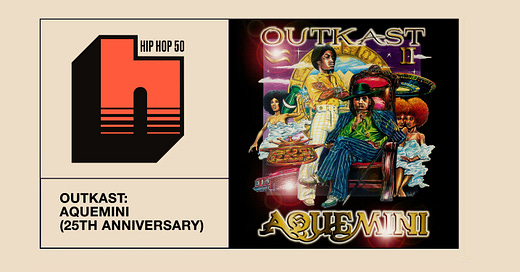Retrospective Review: Aquemini by OutKast
OutKast released their most complete album with ‘Aquemini.'
When OutKast released their third studio album, Aquemini, the hip-hop world witnessed a transformative moment. André “3000” Benjamin and Antwan “Big Boi” Patton had already established themselves as formidable artists with their debut Southernplayalisticadillacmuzik and the subsequent ATLiens. Yet, Aquemini was different—it was a metamorphosis. Big Boi’s proclamation in “Y’all Scared,” “Even though we got two albums, this one feels like the beginning,” captures the essence of this transformation. The album was a rebirth for a duo that had undergone multiple evolutions, emerging with a fresh approach and message each time.
The album’s thematic core revolves around harmonizing disparate musical styles and sensibilities. André 3000 and Big Boi, each with their unique artistic flair, found a way to merge their contrasting personalities into a cohesive musical experience. André, often the abstract thinker, and Big Boi, the street-savvy lyricist, found a middle ground that allowed them to amplify their strengths while creating something synergistic. This harmonization was a musical experiment and a reflection of their evolving personas, shaped by their experiences and influences.
The production of Aquemini is a departure from the conventional, offering a range of live instrumentation that was relatively uncommon in hip-hop at the time. While many artists had employed live instruments to mimic hip-hop beats, OutKast took a more inventive approach. The duo and Mr. DJ, their long-time collaborator, handled most of the album’s production. Their production techniques had been honed under the mentorship of Organized Noize, and this expertise is evident throughout the album. Live instruments were not merely an accompaniment but an integral part of the album’s sonic architecture. Whether it was the soulful horn grooves in “SpottieOttieDopaliscious” or the electric guitar in “Chonkyfire,” each instrument was carefully selected to enhance the album’s thematic depth and emotional resonance.
The album initiates its narrative with “Return of the G,” a slow-burning composition that responds to critics and skeptics. André 3000 and Big Boi use the song to reestablish their credibility, dismissing doubts about their artistic direction. The track sets the emotional and thematic tone for the entire album, making it clear that OutKast is back, but not in the way you might expect.
“Rosa Parks” is a sonic departure, featuring a harmonica-led breakdown that infuses the track with a Southern flair. The song led to a lawsuit from Rosa Parks, which was eventually settled out of court. Despite the legal entanglements, the track remains a standout, highlighting OutKast’s willingness to take risks. The title track delves into existential themes, contemplating the impermanence of success and the relentless march of time. André and Big Boi offer sage advice, urging them to make a lasting impact. The song is a reflective pause in the album, offering a moment to consider their lives.
Both parts of “Da Art of Storytellin’” showcase OutKast’s narrative capabilities. The stories of “Suzy Screw” and “Sasha Thumper” are told with a sense of melancholy, capturing the loss of innocence and the harsh realities of life. The storytelling is evocative, pulling listeners into the world that André and Big Boi create. Featuring a guest verse from Wu-Tang Clan’s Raekwon, “Skew It On the Bar-B” is a lyrical showcase. It’s a reminder that OutKast can hold their own with the best in the business, offering a more traditional hip-hop sound while maintaining their unique flair.
With George Clinton lending his vocals, “Synthesizer” critiques society’s increasing dependence on technology. It’s a funked-out journey into the minds of André and Big Boi, offering a different kind of social commentary. “Slump” and “West Savannah” offer a nod to OutKast’s earlier work, focusing on the grittier aspects of life. They’re a reminder of where the duo came from, contrasting their more experimental work on the album.
Often considered the album’s weakest link, “Mamacita” has been criticized for its problematic themes and grating hook. It’s a misstep that momentarily disrupts the album’s flow but also a lesson in the risks of artistic experimentation, but the seven-minute “SpottieOttieDopaliscious” is a dream-like excursion featuring soulful horns and wistful guitar licks. It’s a late-night cruise through Atlanta’s streets, capturing the essence of youth and the quest for excitement.
Featuring Cee-Lo Green and Erykah Badu, “Liberation” is a departure from traditional rap, focusing instead on themes of freedom and self-improvement. It’s a soulful meditation on breaking free from societal constraints, both mental and physical. The album concludes with this electric guitar-infused track, a critique of fake personas in the hip-hop community. It ends with a clip from OutKast’s 1995 Source Awards speech as a reminder of the duo’s enduring impact.
OutKast’s Aquemini altered the course of hip-hop, particularly in the South. The album broke down barriers, proving that Southern hip-hop could be as experimental, intellectual, and influential as any other subgenre. It validated André 3000’s famous words at the 1995 Source Awards: “The South got something to say.” The South would have something to say and dominate the commercial hip-hop scene in the following years, from Atlanta to Houston to Miami.
The album’s valor to experiment while staying true to its roots makes it a touchstone in hip-hop history. The LP was a statement of purpose, a challenge to the status quo, and a celebration of artistic freedom.




